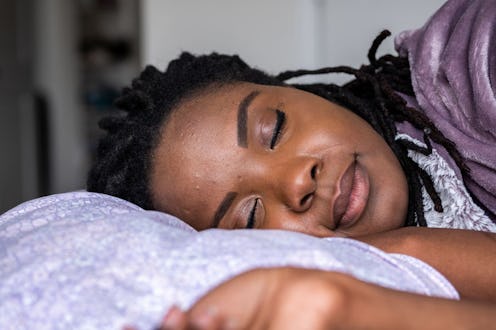Life
Losing Just 16 Minutes Of Sleep Can Have This Shocking Impact On Your Brain

Do you find that your day is greatly affected by going to bed a teensy bit later than usual the night before? Well, a new study seems to show that you're not alone. According to researchers at the University of South Florida, losing a small amount of sleep affects productivity the next day.
The study — which was published in Sleep Health — surveyed 130 middle-aged employees who work in I.T. and had at least one child who was currently attending school.
Over the course of eight consecutive days, participants were asked to report the time they went to bed, when they woke up, how long they slept for, and the quality of their sleep. They were also asked how often they experienced off-task or distracting thoughts during the day. Answers were given on a four-point scale, with zero meaning "never" and four signifying "very often".
Sleeping just 16 minutes less at night was linked to a poorer sense of judgement and a reduction in productivity. They also showed increased stress levels, leading to an earlier bedtime and wake-up call. A similar amount of "cognitive interference" was also seen when respondents woke up 19 minutes earlier than usual. However, the detrimental impact only occurred on weekdays. At weekends, such effects were less obvious.
"These cyclical associations reflect that employees' sleep is vulnerable to daily cognitive stress and also a contributor to cognitively stressful experiences," lead author of the study and assistant professor in the School of Ageing Studies, Soomi Lee, said in a statement.
She added that the study's findings provide some evidence "for why workplaces need to make more efforts to promote their employees' sleep. Good sleepers may be better performers at work due to greater ability to stay focused and on-task with fewer errors and interpersonal conflicts."
The number of hours you should sleep for isn't clear-cut. The National Sleep Foundation states that the appropriate sleep duration differs depending on age. For school-aged children, it is between nine and 11 hours. This decreases to between eight and 10 hours for teenagers. It continues reducing the older you get. Young adults should sleep for between seven and nine hours each night while older adults can cope with just seven or eight hours.
As Healthline reports, factors such as genetics and sleep quality can impact these times. If you sleep well all night, you may feel fine after just six hours, for example. But if you find yourself constantly waking up, you may need longer.
To avoid feeling tired, you need to ensure your body is making it through the entire sleep cycle, states advisory organisation The Sleep Council. It's split into four stages. Non-rapid eye movement (NREM) sleep is comprised of three parts that get deeper as time goes on. The final stage is rapid eye movement (REM) sleep; the part where you may dream.
Each part of the cycle takes around 90 minutes to complete. Do the maths to conclude you should be sleeping for a minimum of six hours for your body and mind to feel revitalised in the morning.
So the next time you feel like watching one more episode of your favourite Netflix series, maybe reconsider. You'll thank yourself the next day.
This article was originally published on